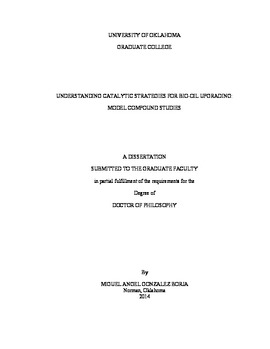| dc.description.abstract | In light of the awareness about climate change and the role that non-renewable sources of energy have had on this issue, there has been a notable effort in the last decades to develop alternative sources of energy. Conversion of ligno-cellulosic biomass has been of special interest because of its potential to produce liquid bio-fuels for direct use in the existing transportation infrastructure. The raw product from ligno-cellulosic biomass thermal processing is bio-oil, an unstable liquid with high content of oxygen. Upgrading the properties of this liquid is challenging, but indispensable in order to make it a suitable transportation fuel or even a source of fine chemicals. The approach for such upgrading has been to use catalytic processes that can selectively remove oxygen while maximizing the carbon retention in the liquid product. The aim of this work is to propose strategies for bio-oil upgrading and provide a fundamental understanding of the phenomena involved in such processes. Since bio-oil is a complex mixture, a set of model reactions was selected for this study. This allowed to understand the simplest cases, and is expected to serve as a foundation for the study of more complex systems, as they get closer to the real bio-oil.
The first stage in the upgrading scheme was proposed to be a vapor phase upgrading stage, and the model reaction studied was hydrodeoxygenation of methoxyphenols over a monolithic catalyst. It was shown that a bimetallic monolith supported catalyst could remove significant amounts of oxygen from guaiacol and anisole under mild reaction conditions. The products from this initial upgrading could then be condensed and undergo liquid phase reactions such as alkylation or hydrogenation; these reactions comprised the second upgrading stage.
Alkylation of phenolics with short alkyl alcohols (both originated from bio-oil) is beneficial because it retains the short compounds in the liquid product as opposed to producing light gases. A kinetic study for alkylation of m-cresol with isopropanol (both model compounds) using a HY zeolite revealed that both ether and ring alkylated products could be obtained and their selectivity could be correlated to factors such as the type of alkylating agent, degree of alkylation, time of reaction, among others. In addition to these, the presence of water had important effects on catalyst activity and therefore its effect was subject of further study. Hot liquid water can severely degrade acidic solids such as the zeolites used for alkylation leading to dramatic deactivation during reaction. A plausible solution is to use a hydrophobic catalyst that could prevent the contact of the solid with liquid water and preserve catalytic activity. With this in mind, it was possible to synthesize and measure the rate of deactivation of a hydrophobic HY zeolite, probing its tremendous advantages over regular zeolites.
As opposed to the alkylation reaction, water may have a positive effect in reactions such as hydrogenation, which are key for bio-oil upgrading. The role of water was then studied using hydrogenation of furfural as a model reaction. Furfural is another product obtained in bio-oil that evolves from the hemicellulose fraction in biomass. It was shown that water could significantly increase the rate of furfural hydrogenation in liquid phase as well as dramatically change the product selectivity. Based on previous studies about the role of water on hydrogenation reactions, it was proposed that water could decrease activation barriers for hydrogenation by shuttling hydrogen atoms from the surface to the furfural molecule as well as stabilizing particular transition states through hydrogen bonding interactions. A future kinetic model for this system could provide further proof of this hypothesis. | en_US |
